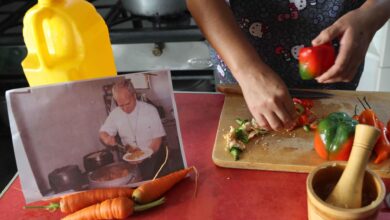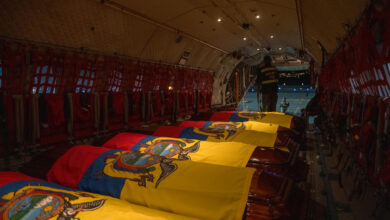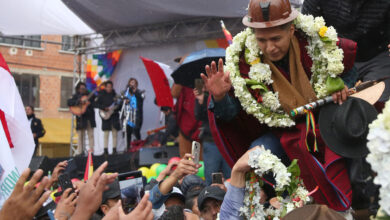Colombia: sexual violence and forgiveness through art
Listen this article
The National Day for the Dignity of Women Victims of Sexual Violence was commemorated with symbolic and artistic acts that seek to build memory and forgiveness

Women who were victims of sexual violence in the context of the armed conflict in Colombia were the protagonists in different activities in the capital with which they sought, through symbolic acts, to heal and ask the Government to support the victims.
Leer en español: Colombia: violencia sexual y perdón a través del arte
The construction of memory, forgiveness and guarantees of non-repetition are the pillars of the peace agreement that was signed in 2016 and are an essential part to heal the wounds left by the war in Colombia. One of the strongest injuries left by this conflict was sexual violence, especially in women members of armed groups.
According to the United Nations, the National Day for the Dignity of Women Victims of Sexual Violence within the Framework of the Internal Armed Conflict, May 24, was established in 2014 as "the result of the request of Jineth Bedoya Lima for the establishment of this date as a measure of satisfaction with collective impact, within the framework of their individual reparation process". From that date on, the day seeks to recognize these victims and that both organizations and the Government contribute to the healing of physical and emotional wounds left by sexual violence.
Among some of the activities within the framework of this day, the Center for Memory, Peace and Reconciliation (CMPR) organized a multi-day agenda, which began on May 24 and will go until the 29th. The main activity was an event that culminated a process called 'Change the skin: female healing through art', in which they made artistic expressions with paint, clay, sewing and many colors." These expressions were means to represent new narratives, the dress being the second skin, symbol of the reconstruction of new life projects in the capital, as well as goals and dreams for the future", according to the CMPR press release.
To complete this healing process, the event 'The body as a territory: sexual violence, forgiveness and justice' was held, which was open to the public and in which the participants, victims in the framework of the armed conflict, reflected on their experiences to achieve justice and truth. In the event, 14 women participated, including civilians, members of the Public Force and armed groups.
Other activities are also taking place in other parts of the city, most of them created with the support of the CMPR, but which are initiatives of groups of victims. For example, that same Friday, May 24, the Congress of the Republic was filled with fabrics that hung around 40 women. These 40 participants represented 40 organizations of victims of sexual violence and came from all over the country to perform this act.
The intention was to draw attention to the lack of help they receive in the remote municipalities of the capital. Thus, they demanded the Government to advance the entities so that the more than 600 victims they represented could rebuild their lives and heal. According to Colombia 2020, what they requested mainly was comprehensive psycho-social care.
You may be interested: Colombia and its 'institutional crisis'
Where are their rights?
The importance of this day lies in that, although the peace agreement includes guarantees for victims and women's rights, they still have difficulties in accessing rights that allow them to strengthen and build through forgiveness. According to the Single Registry of Victims, the more than 27 000 victims of sexual violence do not have easy access to rights or care programs.
According to the CMPR, "in Colombia 29 213 people have made statements for the victimizing act of crimes against integrity and sexual freedom, of which 2 834 were made in Bogotá, as well as 13.06% (370) of the respondents are persons in a situation of disability."
Most of those victims have not had the possibility of their rights being recognized, so Gustavo Quintero, the high commissioner for the victims of the District, said that "this is a day to remember and highlight what can not happen again, to call for solidarity, dignification and the vindication of women's rights. Through different processes we honor the memory and coping capacity of people, of silenced bodies and feelings. Also, the capacities of the female victims of this scourge to rebuild their lives and recover their bodies as places of autonomy and territories of peace".
As a result of this need, general measures have been established that are in the law and should be applicable in the framework of the armed conflict, mentioned by the CMPR. Among them are protection measures for people who are still threatened and live in territories where the conflict persists. Likewise, measures of assistance and attention are contemplated, in which humanitarian aid must be provided to the victims, with accommodation, food, and health.
There are also socio-economic measures, in which victims should have the possibility of accessing jobs or strengthening their own ventures. Finally, the victims must have a comprehensive reparation that includes the restitution of land and housing, access to credits, compensation, etc; but, above all, the possibility of knowing the truth and achieving justice and guarantees of non-repetition.
LatinAmerican Post | Juliana Suárez
Translated from "Colombia: violencia sexual y perdón a través del arte"





